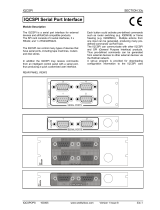Signal Inputs
Analog ................................2 channels balanced via 25 way D-
type connector
Signal Outputs
Analog ................................7 per input channel balanced via 25
way D-type connector
Note: Configurable for 1 input to 14 output operation
Indicators
Power up or CPU fault........Good = Off/Fault = Red
CPU running but input 1 not detected (both inputs or primary
input when in single channel mode)
Input detected = Off/Not Detected =
Yellow
CPU running but input 2 not detected (both inputs or primary
input when in single channel mode)
Input detected = Off/Not detected =
Yellow
Normal operation with input detected (either input or primary
input when in single channel mode)
Input not detected = Off/Input
detected = Green
Controls
Mode ..................................Single, Dual channel
Fine Gain Adjustment.........±0.5 dB additional to the coarse
gain level, separately adjustable for
each input
Functions Available via RollCall
Gain (Separate L and R) ...+24 dB to -24 dB in 0.5 dB steps
Silence Detect ....................Level adjustable, - 15 to -25 dBu in
1 dB steps
Warning Timer....................1 to 60s (for silence detection)
Reporting (* also Logged)
Silence Detected ................*Silence Detected (L and R)
RollTrack Controls..............On/Off, Index, Source, Address,
Command, Status, Sending.
RollTrack............................Unused
Input 1Present
Input 1 Silent
Input 2Present
Input 2 Silent
Specifications
Analog Input/Output Level ..Headroom set to:
+24 dBu (17.5 V pk to pk) Gain at
Unity
Analog Input Impedance.....10 k Ohms (600 Ohm Option)
Analog Output Impedance ..Balanced <50 ohms
Total Harmonic Distortion + Noise
<-94 dBu (0.002%) at 700 Hz,
24 dBu input and 0 dB gain
Gain Accuracy ...................<±0.2 dB @ 0 dB
Gain Error (Channel 1 to Channel 2)
<±0.2 dB @ 0 dB
Common Mode Rejection ...<-70 dB (20 Hz to 20 kHz)
Frequency Response..........±0.1 dB(20 Hz to 20 kHz with
reference to 1 kHz)
Channel 1 to 2 cross talk ....<-110 dB at 1 kHz
Headroom (in and out)........24 dBu (Note: a maximum of 3
outputs can be driven at 24 dBu
when using 600 Ohm terminations)
Power Consumption
Module Power Consumption
8.8 W Max























